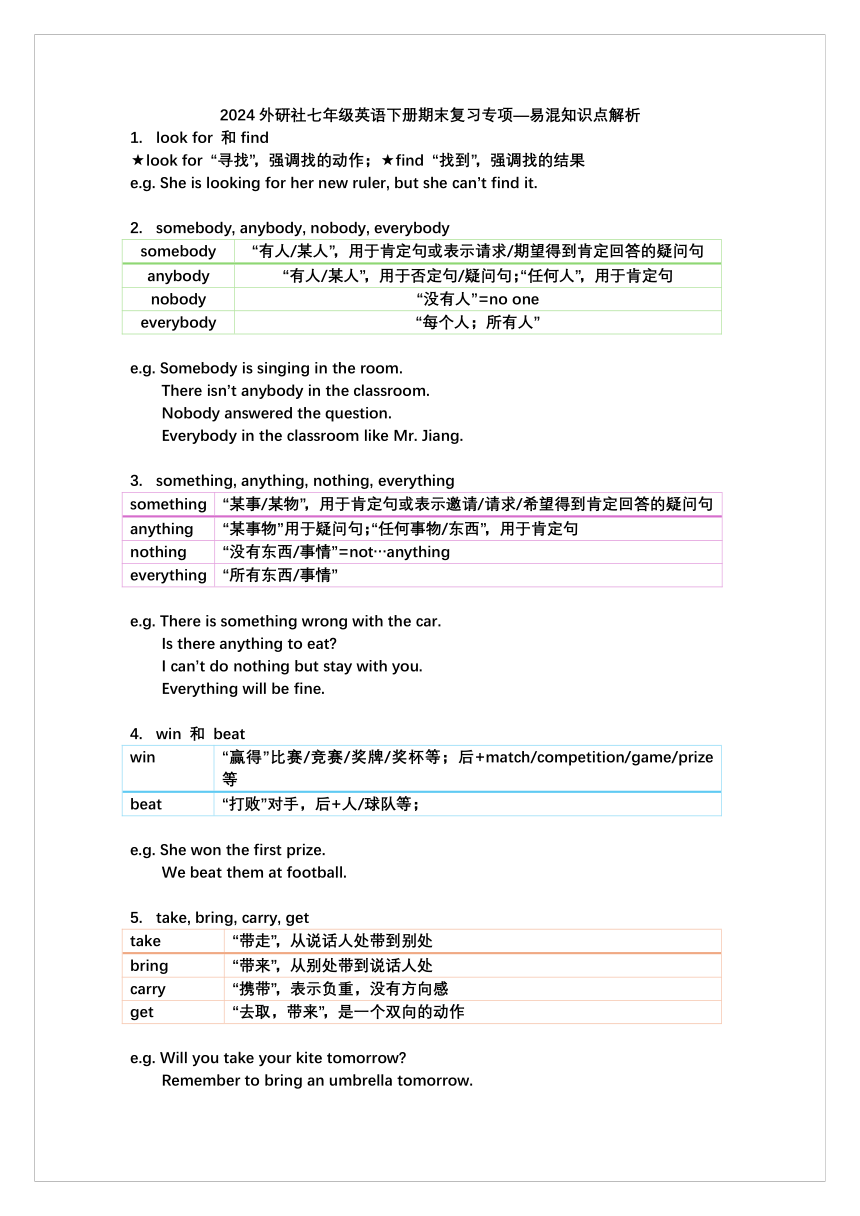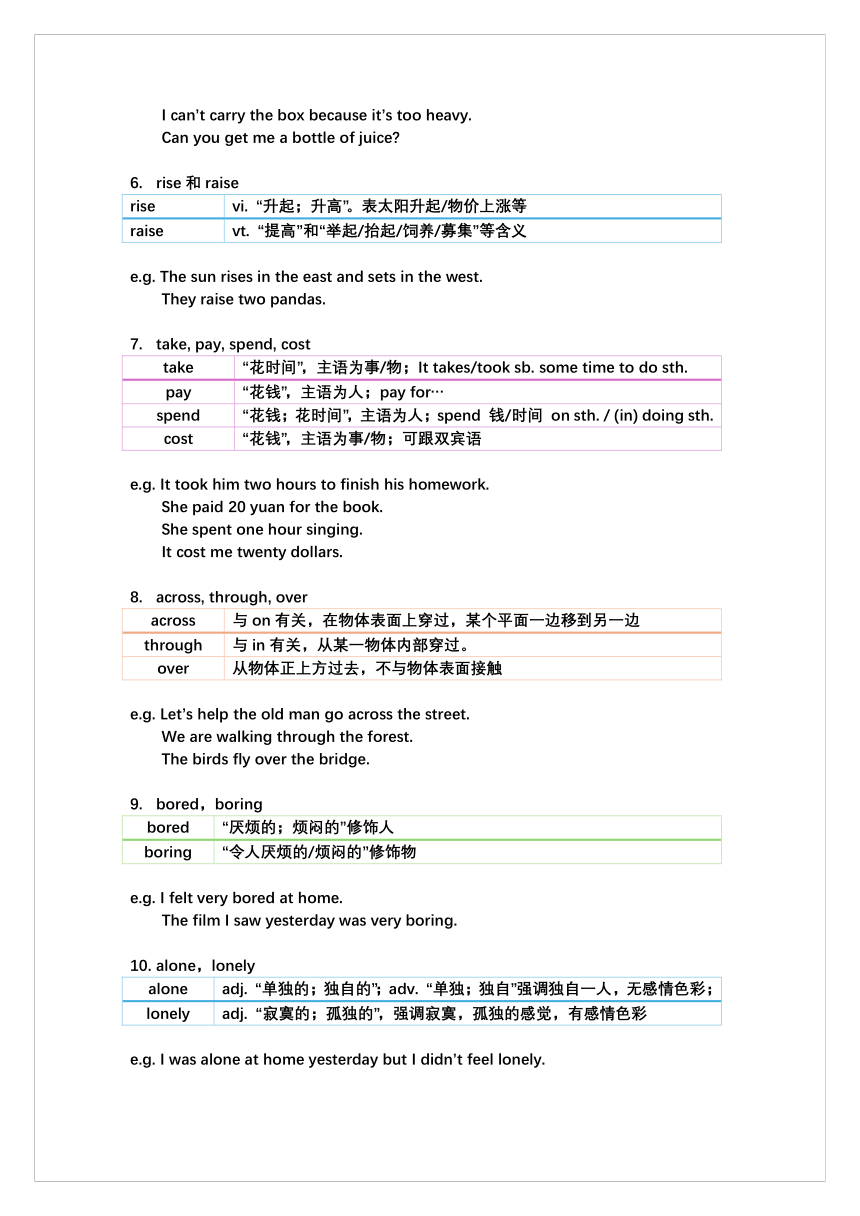期末复习专项-易混知识点解析 外研版七年级英语下册
文档属性
| 名称 | 期末复习专项-易混知识点解析 外研版七年级英语下册 |

|
|
| 格式 | docx | ||
| 文件大小 | 26.7KB | ||
| 资源类型 | 教案 | ||
| 版本资源 | 外研版 | ||
| 科目 | 英语 | ||
| 更新时间 | 2024-04-10 00:00:00 | ||
图片预览


文档简介
2024外研社七年级英语下册期末复习专项—易混知识点解析
look for 和find
★look for “寻找”,强调找的动作;★find “找到”,强调找的结果
e.g. She is looking for her new ruler, but she can’t find it.
somebody, anybody, nobody, everybody
somebody “有人/某人”,用于肯定句或表示请求/期望得到肯定回答的疑问句
anybody “有人/某人”,用于否定句/疑问句;“任何人”,用于肯定句
nobody “没有人”=no one
everybody “每个人;所有人”
e.g. Somebody is singing in the room.
There isn’t anybody in the classroom.
Nobody answered the question.
Everybody in the classroom like Mr. Jiang.
something, anything, nothing, everything
something “某事/某物”,用于肯定句或表示邀请/请求/希望得到肯定回答的疑问句
anything “某事物”用于疑问句;“任何事物/东西”,用于肯定句
nothing “没有东西/事情”=not…anything
everything “所有东西/事情”
e.g. There is something wrong with the car.
Is there anything to eat
I can’t do nothing but stay with you.
Everything will be fine.
win 和 beat
win “赢得”比赛/竞赛/奖牌/奖杯等;后+match/competition/game/prize等
beat “打败”对手,后+人/球队等;
e.g. She won the first prize.
We beat them at football.
take, bring, carry, get
take “带走”,从说话人处带到别处
bring “带来”,从别处带到说话人处
carry “携带”,表示负重,没有方向感
get “去取,带来”,是一个双向的动作
e.g. Will you take your kite tomorrow
Remember to bring an umbrella tomorrow.
I can’t carry the box because it’s too heavy.
Can you get me a bottle of juice
rise和raise
rise vi. “升起;升高”。表太阳升起/物价上涨等
raise vt. “提高”和“举起/抬起/饲养/募集”等含义
e.g. The sun rises in the east and sets in the west.
They raise two pandas.
take, pay, spend, cost
take “花时间”,主语为事/物;It takes/took sb. some time to do sth.
pay “花钱”,主语为人;pay for…
spend “花钱;花时间”,主语为人;spend 钱/时间 on sth. / (in) doing sth.
cost “花钱”,主语为事/物;可跟双宾语
e.g. It took him two hours to finish his homework.
She paid 20 yuan for the book.
She spent one hour singing.
It cost me twenty dollars.
across, through, over
across 与on有关,在物体表面上穿过,某个平面一边移到另一边
through 与in有关,从某一物体内部穿过。
over 从物体正上方过去,不与物体表面接触
e.g. Let’s help the old man go across the street.
We are walking through the forest.
The birds fly over the bridge.
bored,boring
bored “厌烦的;烦闷的”修饰人
boring “令人厌烦的/烦闷的”修饰物
e.g. I felt very bored at home.
The film I saw yesterday was very boring.
alone,lonely
alone adj. “单独的;独自的”;adv. “单独;独自”强调独自一人,无感彩;
lonely adj. “寂寞的;孤独的”,强调寂寞,孤独的感觉,有感彩
e.g. I was alone at home yesterday but I didn’t feel lonely.
smile, laugh
smile n. & v. 指不出声的微笑 smile at sb. 对某人微笑
laugh 指出声的“笑;大笑” laugh at sb. 嘲笑某人
e.g. She turned around and smile at me.
Don’t laugh at others.
each, every
each 强调个体,两者或以上中的“每个”;作代词/副词
every 指整体中的每一个;三者或以上中的“每个”;作限定词,作定语
e.g. Each student in the classroom has different hobbies.
Every student in the classroom agreed with their teacher’s plan.
other, the other, others, another
other 后+可数名词单数/复数
the other 用于one…the other… 一个……另一个……结构
others 泛指其他人,后不+名词
another 泛指三者或以上中的另一个,后+可数名词单数
e.g. She has many other friends.
I have two schoolbags. One is purple and the other is yellow.
We should help others.
He wants to buy another cap.
both, either, neither, all, none
both “两者都”;both…and… ……和……(两者)都
either “两者中的任何一个”;either…or… 要么……要么……;或者……或者……
neither “两者都不”;neither…nor… ……和……(两者)都不
all “全体;全部”,用于“三者/三者以上的人/物”
none “没有一个人/物”,用于“三者/三者以上的人/物都不”
e.g. All of them like collecting stamps.
Both Amy and Tom like playing the piano.
Neither of them speaks Chinese.
None of us has been to Harbin.
Neither My mother nor my father likes watching football match.
elder, older
elder “年长的”,修饰人,作定语
older “年级较大的;更老的;更旧的”,修饰人/物,作定语/表语
e.g. This is my elder brother.
My house is older than yours.
sound, voice, noise
sound 泛指人听到的“声音”,人/动物的声音;也指物体碰撞发出的声音/大自然的任何声音
voice 人的嗓音
noise 不悦耳的“噪声;喧闹声”等
e.g. Don’t make noises. Your sister is sleeping.
She has a beautiful voice.
There is a strange sound outside.
look for 和find
★look for “寻找”,强调找的动作;★find “找到”,强调找的结果
e.g. She is looking for her new ruler, but she can’t find it.
somebody, anybody, nobody, everybody
somebody “有人/某人”,用于肯定句或表示请求/期望得到肯定回答的疑问句
anybody “有人/某人”,用于否定句/疑问句;“任何人”,用于肯定句
nobody “没有人”=no one
everybody “每个人;所有人”
e.g. Somebody is singing in the room.
There isn’t anybody in the classroom.
Nobody answered the question.
Everybody in the classroom like Mr. Jiang.
something, anything, nothing, everything
something “某事/某物”,用于肯定句或表示邀请/请求/希望得到肯定回答的疑问句
anything “某事物”用于疑问句;“任何事物/东西”,用于肯定句
nothing “没有东西/事情”=not…anything
everything “所有东西/事情”
e.g. There is something wrong with the car.
Is there anything to eat
I can’t do nothing but stay with you.
Everything will be fine.
win 和 beat
win “赢得”比赛/竞赛/奖牌/奖杯等;后+match/competition/game/prize等
beat “打败”对手,后+人/球队等;
e.g. She won the first prize.
We beat them at football.
take, bring, carry, get
take “带走”,从说话人处带到别处
bring “带来”,从别处带到说话人处
carry “携带”,表示负重,没有方向感
get “去取,带来”,是一个双向的动作
e.g. Will you take your kite tomorrow
Remember to bring an umbrella tomorrow.
I can’t carry the box because it’s too heavy.
Can you get me a bottle of juice
rise和raise
rise vi. “升起;升高”。表太阳升起/物价上涨等
raise vt. “提高”和“举起/抬起/饲养/募集”等含义
e.g. The sun rises in the east and sets in the west.
They raise two pandas.
take, pay, spend, cost
take “花时间”,主语为事/物;It takes/took sb. some time to do sth.
pay “花钱”,主语为人;pay for…
spend “花钱;花时间”,主语为人;spend 钱/时间 on sth. / (in) doing sth.
cost “花钱”,主语为事/物;可跟双宾语
e.g. It took him two hours to finish his homework.
She paid 20 yuan for the book.
She spent one hour singing.
It cost me twenty dollars.
across, through, over
across 与on有关,在物体表面上穿过,某个平面一边移到另一边
through 与in有关,从某一物体内部穿过。
over 从物体正上方过去,不与物体表面接触
e.g. Let’s help the old man go across the street.
We are walking through the forest.
The birds fly over the bridge.
bored,boring
bored “厌烦的;烦闷的”修饰人
boring “令人厌烦的/烦闷的”修饰物
e.g. I felt very bored at home.
The film I saw yesterday was very boring.
alone,lonely
alone adj. “单独的;独自的”;adv. “单独;独自”强调独自一人,无感彩;
lonely adj. “寂寞的;孤独的”,强调寂寞,孤独的感觉,有感彩
e.g. I was alone at home yesterday but I didn’t feel lonely.
smile, laugh
smile n. & v. 指不出声的微笑 smile at sb. 对某人微笑
laugh 指出声的“笑;大笑” laugh at sb. 嘲笑某人
e.g. She turned around and smile at me.
Don’t laugh at others.
each, every
each 强调个体,两者或以上中的“每个”;作代词/副词
every 指整体中的每一个;三者或以上中的“每个”;作限定词,作定语
e.g. Each student in the classroom has different hobbies.
Every student in the classroom agreed with their teacher’s plan.
other, the other, others, another
other 后+可数名词单数/复数
the other 用于one…the other… 一个……另一个……结构
others 泛指其他人,后不+名词
another 泛指三者或以上中的另一个,后+可数名词单数
e.g. She has many other friends.
I have two schoolbags. One is purple and the other is yellow.
We should help others.
He wants to buy another cap.
both, either, neither, all, none
both “两者都”;both…and… ……和……(两者)都
either “两者中的任何一个”;either…or… 要么……要么……;或者……或者……
neither “两者都不”;neither…nor… ……和……(两者)都不
all “全体;全部”,用于“三者/三者以上的人/物”
none “没有一个人/物”,用于“三者/三者以上的人/物都不”
e.g. All of them like collecting stamps.
Both Amy and Tom like playing the piano.
Neither of them speaks Chinese.
None of us has been to Harbin.
Neither My mother nor my father likes watching football match.
elder, older
elder “年长的”,修饰人,作定语
older “年级较大的;更老的;更旧的”,修饰人/物,作定语/表语
e.g. This is my elder brother.
My house is older than yours.
sound, voice, noise
sound 泛指人听到的“声音”,人/动物的声音;也指物体碰撞发出的声音/大自然的任何声音
voice 人的嗓音
noise 不悦耳的“噪声;喧闹声”等
e.g. Don’t make noises. Your sister is sleeping.
She has a beautiful voice.
There is a strange sound outside.
同课章节目录
